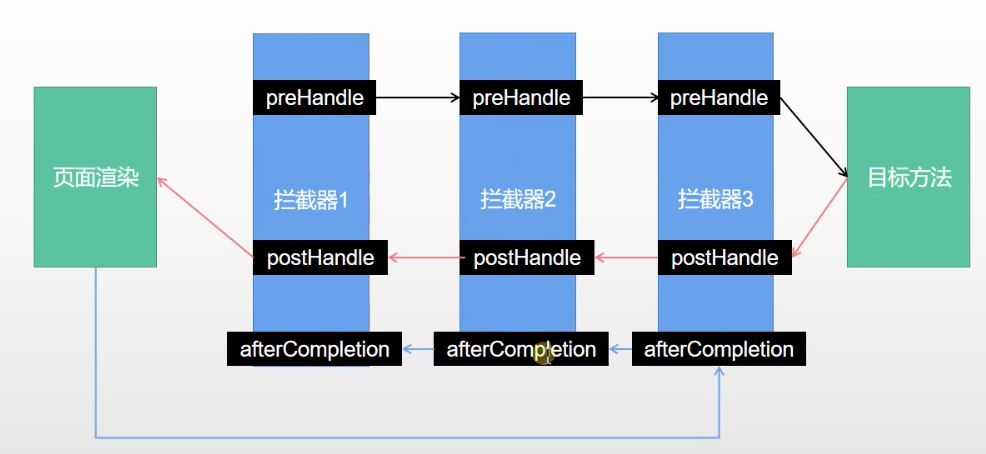- 1、根据当前请求,找到可以处理请求的handler以及handler的所有拦截器
- 2、先来循序执行所有拦截器的preHandle方法
- 1、如果当前preHandle返回true,则执行下一个拦截器的preHandle方法
- 2、如果当前preHandle返回false,则倒序执行afterCompletion方法
- 3、如果任何一个拦截器返回false,直接跳出不执行目标方法
- 4、所有拦截器都返回true,执行目标方法
- 5、倒序执行所有拦截器的postHandle方法。
- 6、前面的步骤有任何异常都会直接触发afterCompletion
- 7、最终在页面渲染完成之后会倒序执行拦截器afterCompletion方法

执行处源码DispatchServlet
@SuppressWarnings("deprecation") protected void doDispatch(HttpServletRequest request, HttpServletResponse response) throws Exception { HttpServletRequest processedRequest = request; HandlerExecutionChain mappedHandler = null; boolean multipartRequestParsed = false; WebAsyncManager asyncManager = WebAsyncUtils.getAsyncManager(request); try { ModelAndView mv = null; Exception dispatchException = null; try { processedRequest = checkMultipart(request); multipartRequestParsed = (processedRequest != request); // Determine handler for the current request. mappedHandler = getHandler(processedRequest); if (mappedHandler == null) { noHandlerFound(processedRequest, response); return; } // Determine handler adapter for the current request. HandlerAdapter ha = getHandlerAdapter(mappedHandler.getHandler()); // Process last-modified header, if supported by the handler. String method = request.getMethod(); boolean isGet = HttpMethod.GET.matches(method); if (isGet || HttpMethod.HEAD.matches(method)) { long lastModified = ha.getLastModified(request, mappedHandler.getHandler()); if (new ServletWebRequest(request, response).checkNotModified(lastModified) && isGet) { return; } } if (!mappedHandler.applyPreHandle(processedRequest, response)) { return; } // Actually invoke the handler. mv = ha.handle(processedRequest, response, mappedHandler.getHandler()); if (asyncManager.isConcurrentHandlingStarted()) { return; } applyDefaultViewName(processedRequest, mv); mappedHandler.applyPostHandle(processedRequest, response, mv); } catch (Exception ex) { dispatchException = ex; } catch (Throwable err) { // As of 4.3, we're processing Errors thrown from handler methods as well, // making them available for @ExceptionHandler methods and other scenarios. dispatchException = new NestedServletException("Handler dispatch failed", err); } processDispatchResult(processedRequest, response, mappedHandler, mv, dispatchException); } catch (Exception ex) { triggerAfterCompletion(processedRequest, response, mappedHandler, ex); } catch (Throwable err) { triggerAfterCompletion(processedRequest, response, mappedHandler, new NestedServletException("Handler processing failed", err)); } finally { if (asyncManager.isConcurrentHandlingStarted()) { // Instead of postHandle and afterCompletion if (mappedHandler != null) { mappedHandler.applyAfterConcurrentHandlingStarted(processedRequest, response); } } else { // Clean up any resources used by a multipart request. if (multipartRequestParsed) { cleanupMultipart(processedRequest); } } } }
boolean applyPreHandle(HttpServletRequest request, HttpServletResponse response) throws Exception { for (int i = 0; i < this.interceptorList.size(); i++) { HandlerInterceptor interceptor = this.interceptorList.get(i); if (!interceptor.preHandle(request, response, this.handler)) { triggerAfterCompletion(request, response, null); return false; } this.interceptorIndex = i; } return true; }
void triggerAfterCompletion(HttpServletRequest request, HttpServletResponse response, @Nullable Exception ex) { for (int i = this.interceptorIndex; i >= 0; i--) { HandlerInterceptor interceptor = this.interceptorList.get(i); try { interceptor.afterCompletion(request, response, this.handler, ex); } catch (Throwable ex2) { logger.error("HandlerInterceptor.afterCompletion threw exception", ex2); } } }
/** * Apply postHandle methods of registered interceptors. */ void applyPostHandle(HttpServletRequest request, HttpServletResponse response, @Nullable ModelAndView mv) throws Exception { for (int i = this.interceptorList.size() - 1; i >= 0; i--) { HandlerInterceptor interceptor = this.interceptorList.get(i); interceptor.postHandle(request, response, this.handler, mv); } }


